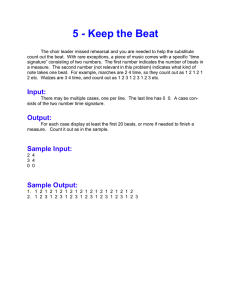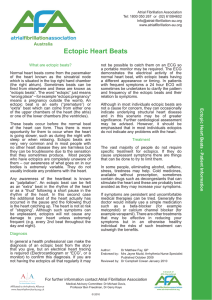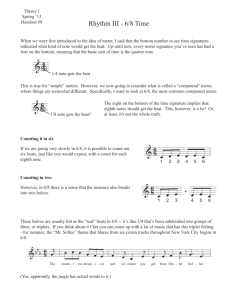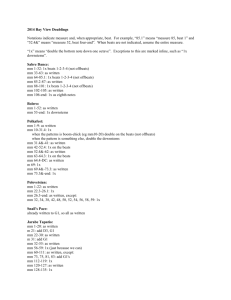AFA Ectopic Heart Beats.indd
advertisement
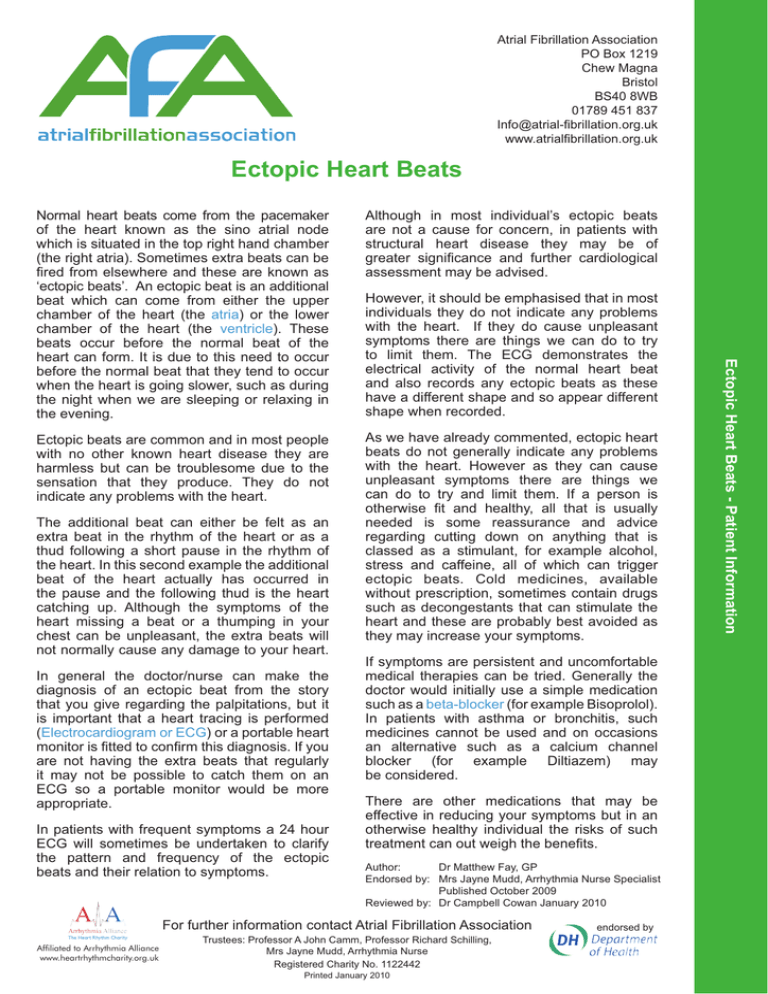
Atrial Fibrillation Association PO Box 1219 Chew Magna Bristol BS40 8WB 01789 451 837 Info@atrial-fibrillation.org.uk www.atrialfibrillation.org.uk Ectopic Heart Beats Although in most individual’s ectopic beats are not a cause for concern, in patients with structural heart disease they may be of greater significance and further cardiological assessment may be advised. Ectopic beats are common and in most people with no other known heart disease they are harmless but can be troublesome due to the sensation that they produce. They do not indicate any problems with the heart. As we have already commented, ectopic heart beats do not generally indicate any problems with the heart. However as they can cause unpleasant symptoms there are things we can do to try and limit them. If a person is otherwise fit and healthy, all that is usually needed is some reassurance and advice regarding cutting down on anything that is classed as a stimulant, for example alcohol, stress and caffeine, all of which can trigger ectopic beats. Cold medicines, available without prescription, sometimes contain drugs such as decongestants that can stimulate the heart and these are probably best avoided as they may increase your symptoms. The additional beat can either be felt as an extra beat in the rhythm of the heart or as a thud following a short pause in the rhythm of the heart. In this second example the additional beat of the heart actually has occurred in the pause and the following thud is the heart catching up. Although the symptoms of the heart missing a beat or a thumping in your chest can be unpleasant, the extra beats will not normally cause any damage to your heart. In general the doctor/nurse can make the diagnosis of an ectopic beat from the story that you give regarding the palpitations, but it is important that a heart tracing is performed (Electrocardiogram or ECG) or a portable heart monitor is fitted to confirm this diagnosis. If you are not having the extra beats that regularly it may not be possible to catch them on an ECG so a portable monitor would be more appropriate. In patients with frequent symptoms a 24 hour ECG will sometimes be undertaken to clarify the pattern and frequency of the ectopic beats and their relation to symptoms. However, it should be emphasised that in most individuals they do not indicate any problems with the heart. If they do cause unpleasant symptoms there are things we can do to try to limit them. The ECG demonstrates the electrical activity of the normal heart beat and also records any ectopic beats as these have a different shape and so appear different shape when recorded. If symptoms are persistent and uncomfortable medical therapies can be tried. Generally the doctor would initially use a simple medication such as a beta-blocker (for example Bisoprolol). In patients with asthma or bronchitis, such medicines cannot be used and on occasions an alternative such as a calcium channel blocker (for example Diltiazem) may be considered. There are other medications that may be effective in reducing your symptoms but in an otherwise healthy individual the risks of such treatment can out weigh the benefits. Author: Dr Matthew Fay, GP Endorsed by: Mrs Jayne Mudd, Arrhythmia Nurse Specialist Published October 2009 Reviewed by: Dr Campbell Cowan January 2010 For further information contact Atrial Fibrillation Association The Heart Rhythm Charity Affiliated to Arrhythmia Alliance www.heartrhythmcharity.org.uk Trustees: Professor A John Camm, Professor Richard Schilling, Mrs Jayne Mudd, Arrhythmia Nurse Registered Charity No. 1122442 Printed January 2010 endorsed by by endorsed Ectopic Heart Beats - Patient Information Normal heart beats come from the pacemaker of the heart known as the sino atrial node which is situated in the top right hand chamber (the right atria). Sometimes extra beats can be fired from elsewhere and these are known as ‘ectopic beats’. An ectopic beat is an additional beat which can come from either the upper chamber of the heart (the atria) or the lower chamber of the heart (the ventricle). These beats occur before the normal beat of the heart can form. It is due to this need to occur before the normal beat that they tend to occur when the heart is going slower, such as during the night when we are sleeping or relaxing in the evening.
